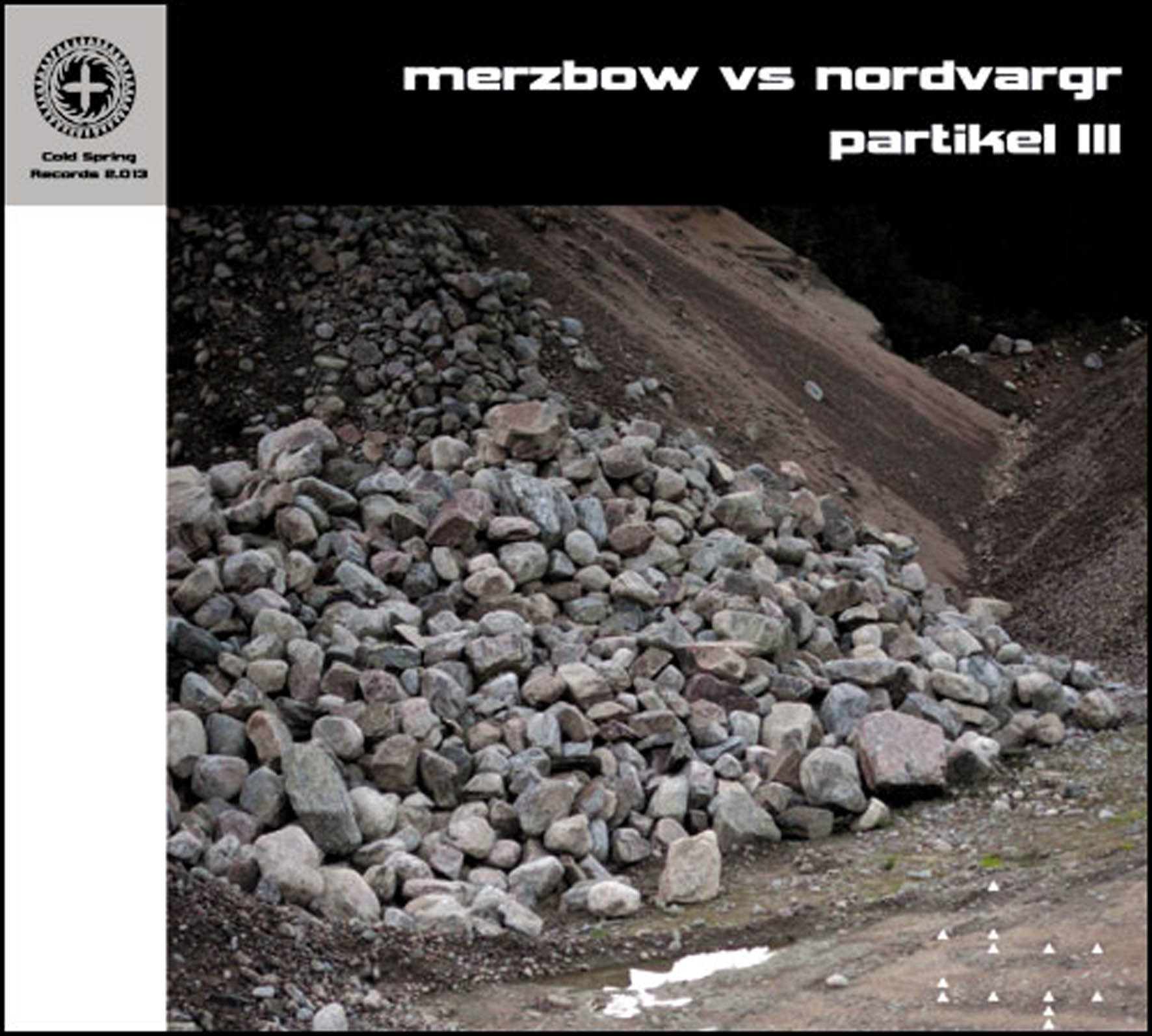 This is the final part of a collaborative trilogy that Henrik Nordvargr Björkk and Masami Akita began back in 2004 and it reaffirms my long-standing belief that Merzbow is almost always more compelling when he is working with other people.  While the two artists divided up creating the raw material for the album, the end result certainly sounds like the duo shared a common vision.  For the most part, the blend of brooding synth drones, subtle pulsing, and Merz-blasts of white noise and dissonant feedback works beautifully, but Henrik and Masami admittedly lose a bit of steam over the album's second half when they ill-advisedly flog a single simple motif for almost half an hour.  Up until that point, however, Partikel III is a quite stellar effort.
This is the final part of a collaborative trilogy that Henrik Nordvargr Björkk and Masami Akita began back in 2004 and it reaffirms my long-standing belief that Merzbow is almost always more compelling when he is working with other people.  While the two artists divided up creating the raw material for the album, the end result certainly sounds like the duo shared a common vision.  For the most part, the blend of brooding synth drones, subtle pulsing, and Merz-blasts of white noise and dissonant feedback works beautifully, but Henrik and Masami admittedly lose a bit of steam over the album's second half when they ill-advisedly flog a single simple motif for almost half an hour.  Up until that point, however, Partikel III is a quite stellar effort.
Lamentably, I have not heard the previous two installments of Partikel, but my tentative hypothesis is that having Masami Akita be the one who starts a piece is generally not a good idea.  Intuitively, it seems like it would be a lot easier to ravage and mutilate something already musical than to try to belatedly turn gnarled chaos into something resembling music and Partikel III seems to fully bear me out on that: the first two pieces (composed by Björkk) are uniformly great, while final two pieces (composed are Akita) are considerably less so, despite there being no noticeable drop in the quality of Merzbow's efforts.
"Heterotic String Hybrid" opens with a surprisingly propulsive techno-inspired beat amidst a sea of subdued white noise before gradually calming down into a nice bit of buzzing, hissing, and brooding ambiance buffeted by woodpecker-like machine noises.  Notably, the duo avoid all of the perils that normally befall dark ambient music, refraining entirely from murky, empty drones; bombast; or a cartoonish degree of gloominess.  Rather, the piece maintains a nicely simmering intensity, as Akita never fully opens up, opting instead for hollow, creepily futuristic beeps and patiently rationed washes of static. Eventually, the beat briefly returns before the piece ends abruptly around the 8-minute mark, making it quite possibly the first time that I have ever wished a Merzbow song had gone on longer.  That is not to say that I do not sometimes love Merzbow, but I usually think more along the lines of "woah" or "i think my ears are bleeding" than "gosh, Akita should have really allowed himself more time to develop that theme."
"Lorentz Covariance" is similarly wonderful, offering up a deep, restrained pulse, stuttering sub-bass, and more inhuman, sci-fi electronic chaos.  Akita gets a bit more violent on this piece, eventually unleashing a torrent of squiggling, howling noise, but it feels well-earned when the eruption finally comes, as it was elegantly preceded by a slow and somewhat strangled build-up.  Also, even the expected firestorm offers quite a bit of (comparative) nuance, as quite a bit of chirping and throbbing almost-music bursts through the surrounding squall (there's even a looped, blown-out beat at one point).  While it is definitely still "noise," it nonetheless manages to feel like it is not far removed from an especially crazy space-rock crescendo instead. Also, I was again sorry to see the piece end, even after another healthily long 8-minute duration.
Unfortunately, all that delightful momentum and wanting of more dissipates rapidly once the duo launch into the album's ostensible centerpiece, the two-part "Submaton Color."  The problem is quite simple to identify, as it stretches on for over half an hour and is built upon a relentless, unchanging synth bass line that sounds like it was plucked from some aggressive '90s industrial dancefloor hit.  Akita gamely tries to keep things interesting by working with mostly dissonant, clashing feedback tones rather than harsh noise, but the thick, throbbing synth hook is just too distracting for it to quite work.
It is actually quite a perverse inversion, as the underlying song is far more forceful than Akita's electronics, yet it is too maddeningly heavy-handed and one-dimensional to enjoy at all.  I fleetingly thought that the piece might be dramatically better if all of Björkk's music was removed (it literally sounds like he just hit "play" on a loop and wandered away), but the Merzbow component is probably far too sparse and slow-building to work on its own.  Gradually, Akita's noise snowballs enough to eclipse the music and things get better, but not nearly enough to justify the wildly indulgent duration and slow build-up.
Despite ending with such a prolonged miscalculation, I was actually quite impressed with this release, as its high points rank among some of the best work that I have heard from Akita.  Also, Partikel III can easily be made into a near-perfect album by simply skipping the 14-minute "Submaton Color, Pt. 1," as the superior second part opens with the synthesizer getting completely eclipsed by the noise storm (or just fading out altogether).  While that basically leaves only a very good Merzbow piece rather than a very good Merzbow and Nordvargr piece (aside from perhaps the cool machine-like throb at the end), the rest of the album otherwise feels like much more than the sum of its parts.  I will definitely be going back to investigate the previous two Partikel installments.
 
Read More

